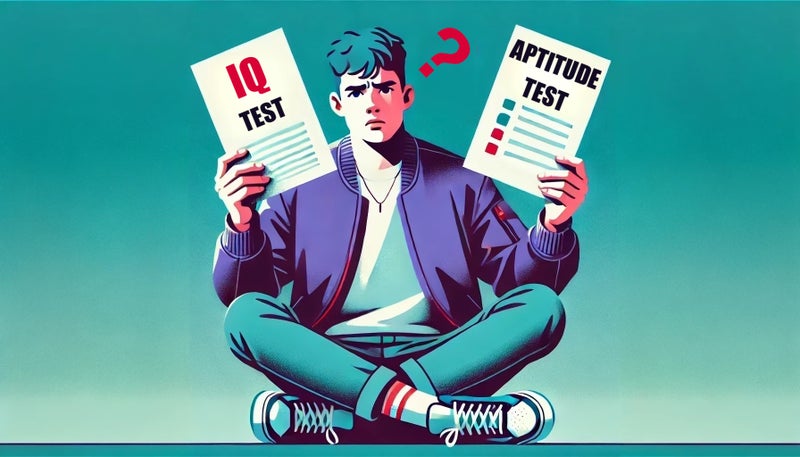Contents
- Unpacking Aptitude Tests: More Than Meets the Eye
- Aptitude Tests vs. Skill Tests vs. IQ Tests
- The Dynamic Duo of Hiring
- What Is an Aptitude Test? The Final Score
Confused about why companies use cognitive aptitude tests in hiring? It's not about your IQ or your resume - it's about something far more valuable. It's time to decode the truth about what they are and why they matter.
So, what is an aptitude test? Top remote hiring teams swear by them. But job seekers? They'd rather eat a cactus.
Many applicants see cognitive aptitude assessments as just another hoop to jump through or a glorified IQ quiz. But here's the truth. They separate high performers from everyone else - and that matters to big companies.
We're about to shatter some myths and draw some hard lines on why these tests are essential for savvy remote recruiters -and potentially your express pass to the big leagues.
Unpacking Aptitude Tests: More Than Meets the Eye
Debunking the Myths
If you've been hunting for tech jobs lately, you've probably bumped into a cognitive aptitude test or two.
Harvard Business Review says that 76% of companies with 100 or more employees use them for external hiring (especially for leadership positions!).
But before we yank back the curtain on these tests, let's tackle some myths that have been floating around.
- Myth #1: "Cognitive aptitude tests are just IQ tests in disguise."
NOPE. They're laser-focused on your ability to learn, adapt, and crack problems.
- Myth #2: "They're designed to trip you up and send you packing."
ABSOLUTELY NOT! This is your shot to outshine your resume and showcase your mettle.
- Myth #3: "Your past experience and skills are all that should count."
NOT ANYMORE. Skills have a shorter shelf life than ever. IBM's big cheese, Arvind Krishna, says it's down to about seven years. Companies need employees with staying power.
- Myth #4: "Aptitude tests are just another barrier to entry."
THINK AGAIN. They're a window into your raw ability, not which ivory tower you climbed out of.
So, What Is a Cognitive Aptitude Test?
Let's cut to the chase. Cognitive aptitude tests are NOT skills or IQ tests.
These tests don’t assess what you already know or gauge your general intelligence.
They measure your ability to:
- Think critically
- Solve problems
- Apply attention to detail
- Learn, understand, and use new information
Why do companies care so much about cognitive aptitude?
Simple. In the face of plummeting skill half-lives and evolving tech, your ability to learn new skills and adapt on the fly is a mouth-watering value add.
Hiring with cognitive aptitude in mind is a long-term investment in a new hire's potential.
Aptitude Tests vs. Skill Tests vs. IQ Tests
Alright, we've busted some myths and pulled back the curtain on what aptitude tests are.
But how do they measure up?
Time for a good old-fashioned face-off.
We're throwing these three into the ring to see who comes out on top in the world of tech hiring.
Cognitive Aptitude Tests: Your Future Potential Unleashed
- Purpose: Predict your ability to learn, adapt, and crush it in new environments.
- Measures: Problem-solving abilities, critical thinking, adaptability, learning potential.
- Use Case: A straight-up bonkers predictor of long-term performance.
Think of cognitive aptitude tests as a sneak peek into your professional future. They measure how quickly you can grasp new concepts, pivot when things change, and tackle problems you've never seen before.
This is why tech companies love them. They're looking for minds that can keep pace as things move forward. Not stumble at the first sight of change.
Research shows cognitive aptitude is one of the most accurate predictors of long-term job success:
- 1.6X more reliable than traditional interviews.
- 4X more predictive than experience alone.
Skill Tests: Your Current Expertise on Display
- Purpose: Evaluate your current knowledge and competencies in specific areas.
- Measures: Specific knowledge and technical skills and how you apply them.
- Use Case: Validates existing expertise for immediate application in a role.
Skill tests are like a snapshot of your current professional toolkit.
For a software engineer, a skills assessment test might involve coding challenges in specific languages, troubleshooting a system issue, or demonstrating proficiency with certain software frameworks.
They're useful for roles where immediate, specific expertise is needed. But they don't predict how well you'll handle the next big change.
IQ Tests: The Controversial Cousin
- Purpose: Gauge general intellectual abilities and cognitive function.
- Measures: ONLY focused on logical reasoning, mathematical ability, verbal skills, pattern recognition.
- Use Case: Rarely used in hiring due to legal and ethical concerns, as well as cultural and educational biases.
IQ tests have fallen out of favor in the hiring world and for good reason.
They've been cited for bias and are pretty meh predictors of future, long-term job performance.
Unlike aptitude tests, which focus on your ability to learn and adapt in specific contexts, IQ tests aim to measure a more generalized form of intelligence that doesn't necessarily translate to job success.
The Dynamic Duo of Hiring
Global remote hiring is really a two-horse race.
Companies are drooling over applicants who have the skills they need right now paired with the ability to adapt and learn tomorrow's skills when they matter.
Picture this:
- Company A only cares about what you know now. They hire hotshots with all the right skills... for today. Fast forward a year, and their team is struggling to keep up with new tech. Oops.
- Company B is all about potential. They snag the quick learners but spend months getting them up to speed. By the time they're ready to roll, the competition has lapped them. Double oops.
- Company C? They're all about looking ahead while moving forward. They use both skills and aptitude tests to find unicorns who can deliver now AND adapt later.
It's simple math (...kind of): Skills tests + aptitude tests = Tech team gold.
What Is an Aptitude Test? The Final Score
At Crossover, we don't just talk the talk - we walk the walk.
We're all in on the Criteria Cognitive Aptitude Test (CCAT).
Here's the skinny on why we’re crazy about it:
- It's a rockstar detector: The CCAT is freakishly good at spotting who's got the chops to crush it in software engineering, management, and other tech roles. It's not about your past - it's about your potential.
- It's the great equalizer: Forget your fancy degrees or big-name former employers. The CCAT doesn't give a hoot about that noise. It's all about what's going on between your ears - pure, unadulterated brainpower.
- It's only 15 minutes: In less time than it takes to order a pizza, this test uncovers your problem-solving abilities, critical thinking, adaptability, and learning potential.
- It's our bet on your future self: We're not just hiring for the now - we're investing in your tomorrow. The CCAT helps us spot the folks who can roll with the punches and come out swinging, no matter what curveballs the tech world throws.
And the big wigs are finally catching on to what we've known all along.
Nearly half of companies (49%) are using tests like the CCAT in their hiring process in 2024, up from a measly third (32%) just two years ago. The market for these tests is set to explode to nearly $6.5 billion by 2030.
Like we said. The industry is finally catching on.
Next time you're staring down the barrel of an aptitude test, remember: This isn't just another hoop to jump through. It's your moment to shine and show you're not just another cog in the machine.
You're a superstar in the making.
What to travel further down the rabbit hole? Take a look at our official CCAT guide to learn more about how Crossover uses the CCAT to hire top international talent!









